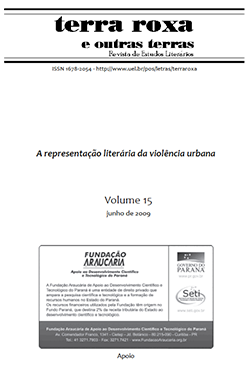Considerations about the Detective story genre and the NoVEL O Crime da Gávea, BY Marcilio Moraes
DOI:
https://doi.org/10.5433/1678-2054.2009v15p96Keywords:
Detective story, Enigma, Violence, Contemporary narrativeAbstract
This article demonstrates through the analysis of the evolution of detective story genre that the novel Crime da Gávea, by Marcílio Moraes, in its representation of violence in the metropolis, integrates representative elements of traditional detective narratives and, nevertheless, it constitutes a contemporary detective narrative.Downloads
References
BATAILLE, Georges. O erotismo. São Paulo: Arx, 2004.
CASTELLO BRANCO, Lucia. O que é Erotismo?. São Paulo: Ed. Brasiliense, 1984.
LEITE, Ligia Chiappini Moraes. O foco narrativo. São Paulo: Ática, 2002.
MATTA, Luis Eduardo. “Crimes e mistério nas letras nacionais”. Digestivo Cultural.06 jan. 2004. Disponível em: <http://www.digestivocultural.com/colunistas/imprimir.asp?codigo=1254> . Acesso em: 02 de jun. de 2008.
MORAES, Marcilio. O crime da Gávea. Rio de Janeiro: 7 Letras, 2003.
PIGLIA, Ricardo. “Os Sujeitos trágicos”. In: Formas breves; tradução José Carlos de Macedo - São Paulo: Companhia das Letras, 2004.
POE, Edgar Allan. Os Crimes da Rua Morgue. Mem Martins: Publicações Europa América, 1981.
PONTES, Mário. Elementares. Notas sobre a história da literatura policial.Ri Janeiro: Odisséia, 2007.
REIMÃO, Sandra Lúcia. O que é romance policial. São Paulo: Brasiliense, 1983.
TODOROV, Tzvetan. “Tipologia do romance policial”. In: As estruturas narrativas. São Paulo: Perspectiva, 1970.
Downloads
Published
How to Cite
Issue
Section
License
Authors who publish in this journal agree to the following terms:
a) The authors retain the copyright and grant the journal the right of first publication, the work being simultaneously licensed under the Creative Commons Attribution-NonCommercial 4.0 International License, allowing the sharing of the work with acknowledgment of the authorship of the work and initial publication in this journal.
b) Authors are authorized to assume additional contracts separately, for non-exclusive distribution of the version of the work published in this journal (eg, publish in an institutional repository or as a book chapter), with acknowledgment of authorship and initial publication in this journal.
c) Authors are allowed and encouraged to publish and distribute their work online (e.g. in institutional repositories or on their personal page) after the editorial process, as this can generate productive changes as well as increase impact and citation of the published work (See The Effect of Open Access).
d) The authors of the approved works authorize the journal to, after publication, transfer their content for reproduction in content indexers, virtual libraries and the like.
e) The authors assume that the texts submitted for publication are of their original creation, taking full responsibility for their content in case of any objection by third parties.



















